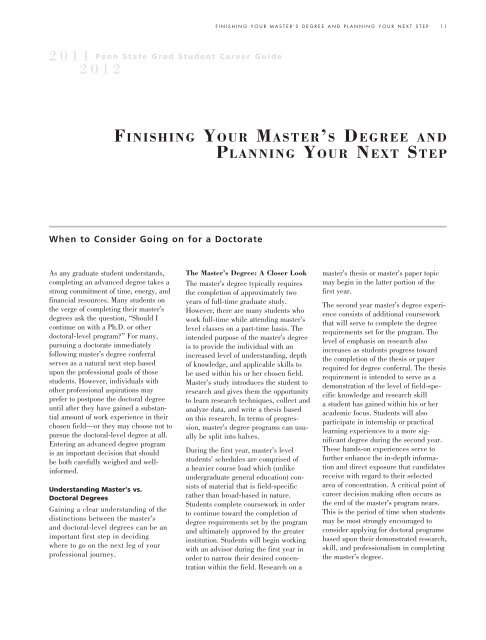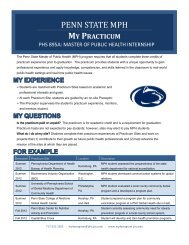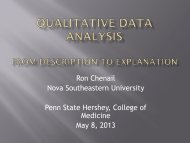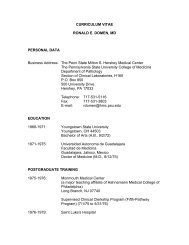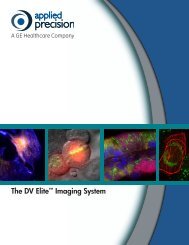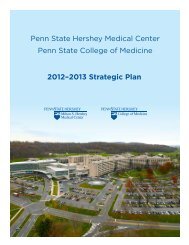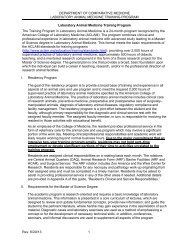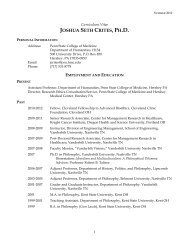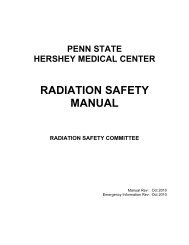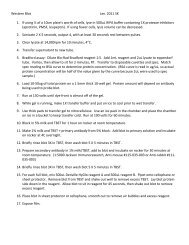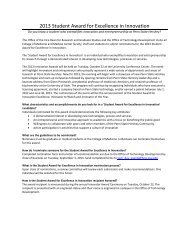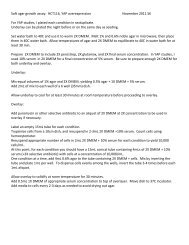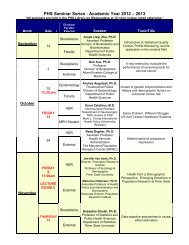Penn State Graduate Student Career Guide - Biomedical Sciences ...
Penn State Graduate Student Career Guide - Biomedical Sciences ...
Penn State Graduate Student Career Guide - Biomedical Sciences ...
You also want an ePaper? Increase the reach of your titles
YUMPU automatically turns print PDFs into web optimized ePapers that Google loves.
FINISHING YOUR MASTER’S DEGREE AND PLANNING YOUR NEXT STEP 11<br />
<strong>Penn</strong> <strong>State</strong> Grad <strong>Student</strong> <strong>Career</strong> <strong>Guide</strong><br />
2011<br />
2012<br />
Finishing Your Master’s Degree and<br />
Planning Your Next Step<br />
When to Consider Going on for a Doctorate<br />
As any graduate student understands,<br />
completing an advanced degree takes a<br />
strong commitment of time, energy, and<br />
financial resources. Many students on<br />
the verge of completing their master’s<br />
degrees ask the question, “Should I<br />
continue on with a Ph.D. or other<br />
doctoral-level program?” For many,<br />
pursuing a doctorate immediately<br />
following master’s degree conferral<br />
serves as a natural next step based<br />
upon the professional goals of those<br />
students. However, individuals with<br />
other professional aspirations may<br />
prefer to postpone the doctoral degree<br />
until after they have gained a substantial<br />
amount of work experience in their<br />
chosen field—or they may choose not to<br />
pursue the doctoral-level degree at all.<br />
Entering an advanced degree program<br />
is an important decision that should<br />
be both carefully weighed and wellinformed.<br />
Understanding Master’s vs.<br />
Doctoral Degrees<br />
Gaining a clear understanding of the<br />
distinctions between the master’s<br />
and doctoral-level degrees can be an<br />
important first step in deciding<br />
where to go on the next leg of your<br />
professional journey.<br />
The Master’s Degree: A Closer Look<br />
The master’s degree typically requires<br />
the completion of approximately two<br />
years of full-time graduate study.<br />
However, there are many students who<br />
work full-time while attending master’s<br />
level classes on a part-time basis. The<br />
intended purpose of the master’s degree<br />
is to provide the individual with an<br />
increased level of understanding, depth<br />
of knowledge, and applicable skills to<br />
be used within his or her chosen field.<br />
Master’s study introduces the student to<br />
research and gives them the opportunity<br />
to learn research techniques, collect and<br />
analyze data, and write a thesis based<br />
on this research. In terms of progression,<br />
master’s degree programs can usually<br />
be split into halves.<br />
During the first year, master’s level<br />
students’ schedules are comprised of<br />
a heavier course load which (unlike<br />
undergraduate general education) consists<br />
of material that is field-specific<br />
rather than broad-based in nature.<br />
<strong>Student</strong>s complete coursework in order<br />
to continue toward the completion of<br />
degree requirements set by the program<br />
and ultimately approved by the greater<br />
institution. <strong>Student</strong>s will begin working<br />
with an advisor during the first year in<br />
order to narrow their desired concentration<br />
within the field. Research on a<br />
master’s thesis or master’s paper topic<br />
may begin in the latter portion of the<br />
first year.<br />
The second year master’s degree experience<br />
consists of additional coursework<br />
that will serve to complete the degree<br />
requirements set for the program. The<br />
level of emphasis on research also<br />
increases as students progress toward<br />
the completion of the thesis or paper<br />
required for degree conferral. The thesis<br />
requirement is intended to serve as a<br />
demonstration of the level of field-specific<br />
knowledge and research skill<br />
a student has gained within his or her<br />
academic focus. <strong>Student</strong>s will also<br />
participate in internship or practical<br />
learning experiences to a more significant<br />
degree during the second year.<br />
These hands-on experiences serve to<br />
further enhance the in-depth information<br />
and direct exposure that candidates<br />
receive with regard to their selected<br />
area of concentration. A critical point of<br />
career decision making often occurs as<br />
the end of the master’s program nears.<br />
This is the period of time when students<br />
may be most strongly encouraged to<br />
consider applying for doctoral programs<br />
based upon their demonstrated research,<br />
skill, and professionalism in completing<br />
the master’s degree.


